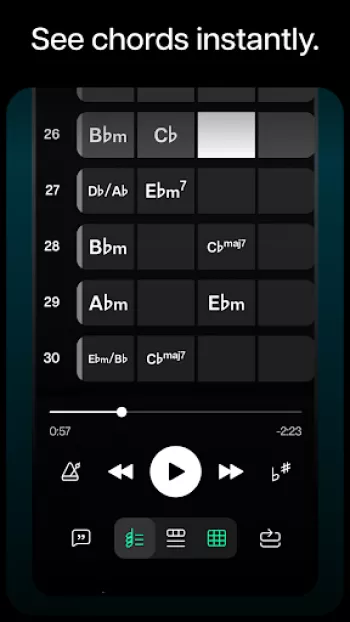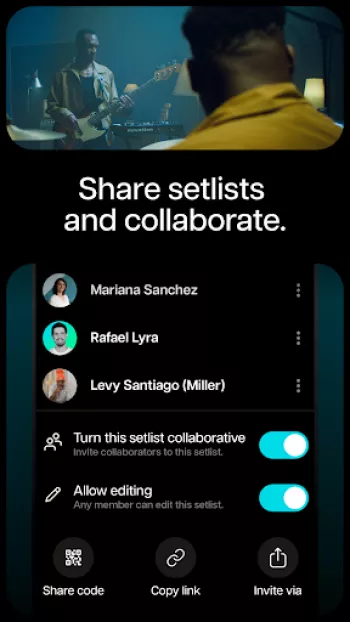Apps Home

The Revolutionary Impact of AI on Music Production
Artificial Intelligence (AI) has been a game-changer in numerous fields, and music production is no exception. The advent of AI in the music industry has opened new avenues for creativity, innovation, and efficiency. The Smart Music Assistant, notably, has been at the forefront of this revolution, providing musicians with innovative solutions to enhance their craft. AI's ability to analyze and process vast amounts of data quickly allows it to understand musical patterns, trends, and preferences, offering personalized suggestions and improvements. This technology can identify subtle nuances in music that were previously discernible only to the most trained ears, giving both novice and professional musicians alike a valuable tool for refining their work. For instance, by using AI-driven vocal and instrument separation tools, musicians can isolate individual tracks within a song – an arduous task that traditionally required extensive studio time and expense. This capability allows musicians to remix and recreate tracks with ease. Moreover, AI’s role in mastering and mixing tracks cannot be overstated. It provides real-time feedback on pitch, tempo, and harmony, and can even automate the final mixing process while ensuring that the creative nuance of the original work is preserved. The Smart Music Assistant utilizes these capabilities effectively, making it a favorite among artists looking to push the boundaries of traditional music production. The implications for live performances are equally groundbreaking, as AI can help artists adapt and improvise based on crowd feedback, creating dynamic experiences that are tailored to the moment. Essentially, AI brings music creation closer to being an interactive and real-time art form, changing not just how music is made, but how we experience it.
Advancing Music Education Through Smart Tools
Education is another domain where Smart Music Assistants are making significant strides, redefining how music is taught and learned. With interactive and intelligent features, these assistants provide a platform for students to experiment and learn at their own pace. They offer a suite of tools such as AI Chord Detection and Smart Metronomes, which allow students to see and hear their progress in tangible ways. AI Chord Detection comes in particularly handy when students want to understand the structure of a musical piece. By providing visual cues and real-time feedback, learners can easily grasp complex compositions and practice efficiently. Moreover, the ability to alter tempo and pitch using an Audio Speed Changer or Pitch Shifter equips students with the flexibility to approach their music in numerous ways, adapting songs to fit their skill level. More than ever before, students can engage in learning that is as fun as it is educational, with Smart Music Assistants fostering a more personalized and adaptive learning environment. Notably, with features such as AI Lyric Transcription, students can also delve into songwriting and composition, seeing their lyrics transformed into musical compositions instantly. This seamless integration of theory and practice encourages a deeper understanding of music as a holistic craft rather than a disjointed set of skills. Furthermore, by offering multilingual support for lyrics in different languages, the Smart Music Assistant ensures that the educational benefits are accessible to diverse users globally. By breaking down barriers to music education and providing inclusive, engaging, and effective learning tools, Smart Music Assistants are poised to nurture the next generation of musicians in unprecedented ways.
Unparalleled Creative Freedom for Musicians
The creative process of making music is deeply personal, and the Smart Music Assistant enhances this experience by providing tools that give musicians more freedom than ever before. The ability to separate and manipulate different musical elements of a song means that artists can experiment with new sounds, styles, and compositions in a way that was traditionally restricted by technological limitations and prohibitive costs. For instance, with audio separation capabilities, musicians can isolate vocals from instruments to create innovative remixes or focus on specific elements for practice and performances. The concept of stem manipulation allows musicians to play with individual components of a track, offering a sort of sandbox for them to craft entirely new musical experiences. Furthermore, the Smart Music Assistant supports creativity with features such as loop generation and smart backing tracks, which provide a virtual band for artists to accompany and augment their performances. The integration of AI Voice Studio enables musicians to access a variety of high-quality vocal sounds, broadening their artistic repertoire and allowing them to conjure up unique musical narratives. Another spectacular feature is the AI mixer, which permits artists to forge complex soundscapes by blending various tracks together effortlessly, resulting in cohesion and fluidity in their music. This flexibility isn't limited to studio environments; musicians can leverage these tools on stage, in real-time, pushing the boundaries of live performances with dazzling effects and on-the-fly adjustments that keep every show fresh and dynamic. Thus, Smart Music Assistants serve as invaluable companions for artists seeking unbounded exploration of their musical instincts, ushering a new era where virtually anything imaginable in music creation can be realized.
Transforming the Listening Experience
With the advent of Smart Music Assistants, the way audiences interact with music has transformed dramatically. Traditionally, listeners were passive recipients of musical content, but advances in AI technology have enabled a more participatory experience. The inclusion of features such as AI Key Detection and pitch modification allows listeners to customize songs to their preferences, making music truly their own. This not only personalizes the listening experience but also bridges the gap between artists and audiences, as fans can interact with songs in personalized and meaningful ways. The transformative potential of AI in music extends further, allowing listeners to engage in karaoke with high-quality, AI-generated backing tracks, offering them a platform to engage interactively with music. Features like real-time lyric transcriptions across multiple languages promote inclusivity and accessibility, ensuring that non-native speakers can participate in the musical experience like never before. Similarly, the integration of smart metronomes and AI-generated chord sheets for personal use means that amateur musicians and enthusiasts can appreciate music on a deeper level, by engaging with its structure and components directly. Moreover, with access to high-fidelity audio separation models, even complex tracks are easily customizable, from splitting lead and background vocals to modifying percussion sections. This unprecedented control over music plays a pivotal role in redefining how we consume and appreciate music, making it a more active and collaborative experience that tailors itself to individual tastes and capabilities, contributing to the evolution of music appreciation in today's digital age.
Embracing Technological Integration Across Platforms
The accessibility and flexibility of Smart Music Assistants, like Moises, exemplify a commitment to technological integration across multiple platforms, fostering a seamless transition for users from one device to another. Whether accessed via Download for Android, Download for iPhone, Download for Windows, or Download for Linux, users experience cohesion and reliability in an ever-connected digital ecosystem. This cross-platform availability ensures that users can work on their musical projects wherever they are, moving between a studio environment and a mobile device seamlessly, without compromising on functionality or quality. The User Interface has been designed meticulously to be intuitive and user-friendly, allowing users to navigate through sophisticated options and enhance their productivity without being bogged down by technical barriers. The Smart Music Assistant’s ability to the import songs from various cloud sources, such as Google Drive, Dropbox, and iCloud, as well as direct from Apple Music or other applications like WhatsApp, speaks volumes about its versatility and ensures that users have their music accessible any time they need it. Furthermore, its export options, providing high-quality audio files in formats like MP3, M4A, and WAV, open avenues for users to share and collaborate on musical projects globally. This democratization of sophisticated music production tools underlines the importance of integrating AI with technology-users' daily lives, pushing the boundaries of what’s possible in both creating and experiencing music. The promising trend of integration across various platforms points towards a future where collaborative, inclusive, and innovative music creation and consumption is within reach for everyone, revolutionizing the landscape of the music industry.
Share Your Opinion
Your Email Will Not Be Published.
All Rights Reserved © Apps Home 2025













































KatiBugg89
I love Moises!!!! I love the simplistic design & user friendliness of the app! It is SO easy to upload a file & break it down into customizable STE...
Michael Craver
The quality of the separation is insane. This is by far the best song separation application I've ever used. This is crazy, it got the low growls i...
Cesar Wittman
This app is amazing. I was searching for apps that could separate the music and vocals. All of the apps and websites I have used before always muff...
David R Thomas
after trying it out, I decided to subscribe. I would much prefer to own a program outright as opposed to paying a subscription. however this progra...
Nathan Freeberg
This app is amazing, even with the free version. Tracks are easy to upload, and the vocal, bass, drums, and guitars are separated very well. Makes ...